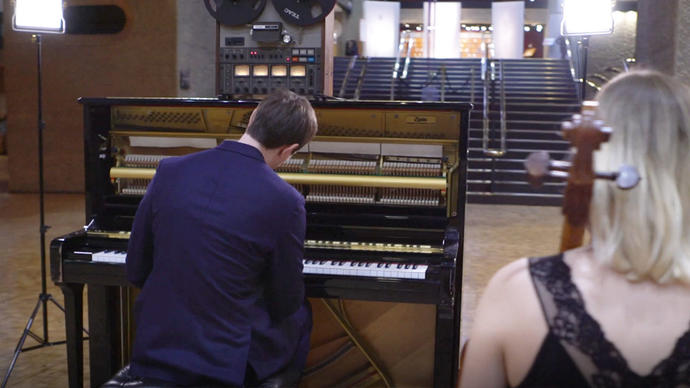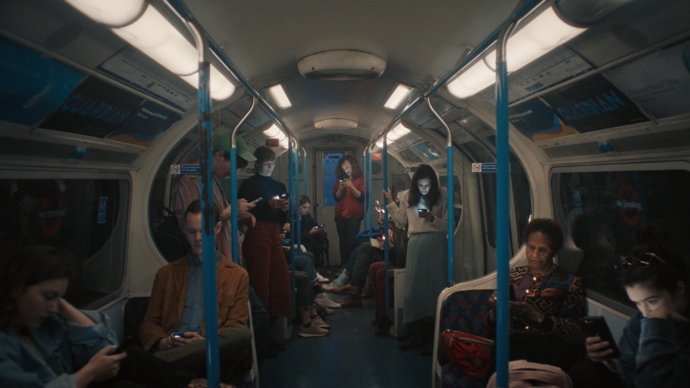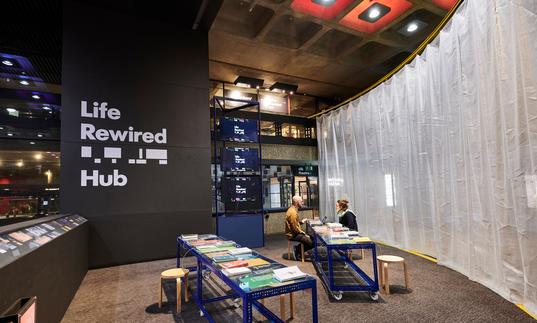Icebreaker: Apollo
2 hours 20 minutes with interval
Please note all timings are approximate and subject to change

Martin Aston looks into the history behind Apollo alongside other works being performed by eclectic ground-breaking composers.
When man first stepped on the moon, on July 20th, 1969, ‘ambient music’ had not been invented. The genre got its name from Brian Eno after he’d released the album Discreet Music in 1975, alluding to a sound ‘actively listened to with attention or as easily ignored, depending on the choice of the listener,’ and which existed on the, ‘cusp between melody and texture.’
One small step, then, for the categorisation of music, and one giant leap for Eno’s profile, which he expanded over a series of albums (and production work) both song-based and ambient. In 1983, assisted by his younger brother Roger (on piano) and Canadian producer Daniel Lanois, Eno provided the soundtrack for Al Reinert’s documentary Apollo: the trio’s exquisitely drifting, beatific sound profoundly captured the mood of deep space, the suspension of gravity and the depth of tranquillity and awe that NASA’s astronauts experienced in the missions that led to Apollo 11’s Neil Armstrong taking that first step on the lunar surface.
‘One memorable image in the film was a bright white-blue moon, and as the rocket approached, it got much darker, and you realised the moon was above you,’ recalls Roger Eno. ‘That feeling of immensity was a gift: you just had to accentuate the majesty.’
In 2009, to celebrate the 40th anniversary of that epochal trip, Tim Boon, head of research at the Science Museum in London, conceived the idea of a live soundtrack of Apollo to accompany Reinert’s film (which had been re-released in 1989 in a re-edited form, and retitled For All Mankind. The version shown by the Science Museum was another cut that used elements of the original and the recut). British 12-piece chamber ensemble Icebreaker were chosen to perform the new piece, arranged by the South Korean composer Woojun Lee. After a series of Apollo performances over the years, and an album recording in 2012, Icebreaker bring their version to the Barbican for the moon landing’s 50th anniversary.
‘Icebreaker started out playing mostly loud, energetic post-minimalist music, so Apollo was very different for us,’ recalls co-founder James Poke. ‘It’s also quite demanding, playing music as delicate as Apollo, in a different way to more complex rhythms. But it leaves you with a great sense of fulfilment. I think it’s Eno’s best ambient album, because it has such a special, evocative mood.’
Also taking part is pedal steel guitarist B J Cole, to play Daniel Lanois’ parts on the original soundtrack that were inspired by the Apollo 11 crew’s preferred on-board playlist of country music. The pedal steel’s elongated reverberations equally evoked the vast emptiness of space, and opened up Cole’s world. ‘Apollo affected me deeply because it came along when I needed my view of the pedal steel to be expanded,’ he recalls. ‘After Apollo, I used the instrument in a more ambient textural way, including working on an album by [Eno ambient associate] Harold Budd, at Daniel Lanois’ studio in New Orleans. Playing the album with Icebreaker brings things full circle for me, as well as it being a fantastic piece of music.’
Icebreaker’s version of Apollo occupies the second half of their Barbican concert, preceded by the ensemble interpreting five striking and contrasting works by two renowned British and three American composers.
Two pieces might be called post-minimalist, and were written specifically for Icebreaker: the fourth part of (Miami-born) Michael Gordon's polyrhythmic opus Trance, and Gavin Bryars’ serene The Archangel Trip, ‘to provide as a good balance to the other pieces,’ says Poke. ‘And Eno and Gavin have a link too [Bryars’ 1975 album The Sinking Of The Titanic was the first release on Eno’s Obscure Records label].
Two are more maximalist in nature: The Vapours by Anna Meredith (originally from her 2015 debut album Varmints] and Black Origami, the title track from the second album by Jlin. The fifth piece bridges post-minimalism and maximalism, and probably several other -isms too: Epizootics by the late Scott Walker (recorded for his 2012 album Bish Bosch), featuring his original vocals.
Says Poke, ‘What the bulk of the pieces have in common revolves around a project, started by Apollo, taking recorded electronic music and recreating it for a live performance. BJ Cole played pedal steel too on the original ‘Epizootics’, but it was heavily manipulated and cut up by Scott, which BJ wouldn’t be able to play live, so we’re faced with the challenge of translating the music.’
Says Cole, ‘Scott originally asked me to play pedal steel in a Hawaiian style that wasn’t Hawaiian! For the Icebreaker performances, I’ve had to relearn it in a way I didn’t play to begin with, which is against your intuition. But it’s a great honour playing with Icebreaker. They’re fantastic musicians who can play and read anything, and the more I work with them, the more I learn.’
With Al Reinert’s film and Icebreaker’s Apollo combined, we may learn something of the feeling of weightlessness and endless horizons of space; and with the other five compositions in the show, we may learn something of the diversity and brilliance of contemporary music. Fasten your seat belts…
Produced by the Barbican
Anna Meredith The Vapours
Scott Walker Epizootics
Gavin Bryars The Archangel Trip
Jlin Black Origami
Michael Gordon Trance part 4
Brian Eno, Daniel Lanois, Roger Eno (arr. Woojun Lee aka Kayip) Apollo
2 hours 20 minutes with interval
Please note all timings are approximate and subject to change
Discover

Barbican Sessions: Erland Cooper
Scottish multi-instrumentalist and producer Erland Cooper brings a tape machine, a piano and a cello together for an intimate performance in the Barbican Foyer.

Life Rewired Shorts - Divided We Scroll by Klaas Diersmann
How long have you spent scrolling today? Klaas Diersmann presents an experimental and eerie depiction of our intimate yet divisive and compulsive relationships with mobile technologies.

Barbican Sessions: Andrew Bird
For our most recent Barbican Session, multi-instrumentalist, songwriter, and prodigious whistler Andrew Bird performs ‘Sisyphus’ from his latest album My Finest Work Yet.
You might also like...


Barbican Hall
Location
The Barbican Hall is located within the main Barbican building. Head to Level G and follow the signs to find your seating level.
Address
Barbican Centre
Silk Street, London
EC2Y 8DS
Public transport
The Barbican is widely accessible by bus, tube, train and by foot or bicycle. Plan your journey and find more route information in ‘Your Visit’ or book your car parking space in advance.
We’ve plenty of places for you to relax and replenish, from coffee and cake to wood-fired pizzas and full pre-theatre menus
Mobility
Spaces for wheelchair users in row U at the rear of the stalls (up to sixteen, depth of row 180cm) and the back row of the circle (four), both with fold-down companion seats. Some seats in row S of the stalls for people with very limited mobility.
Assistance dogs
Assistance dogs may be taken into the concert hall where there are a limited number of suitable seats in row G of the stalls. If you prefer, you may leave your dog with a member of the cloakroom staff during the performance.
Hearing facility
There is an induction loop in the concert hall. You can use this by adjusting your hearing aid to the ‘T’ setting.
Free large-print programmes
These are available for most of our concerts. Please contact [email protected] at least a week beforehand, to prebook a large-print programmme.
For more access information, please visit our Accessibility section.
Plan your visit
Meet friends, grab a drink, drop in to one of the free installations on Level G before the show - here's what else is happening at the Barbican when you visit.

Part of Life Rewired

Living Colour






